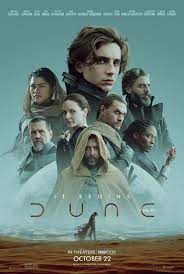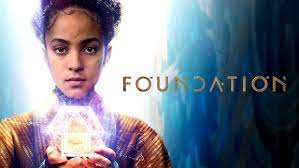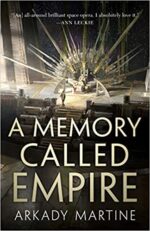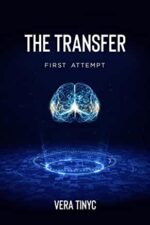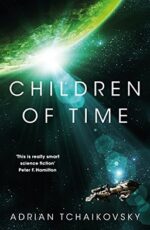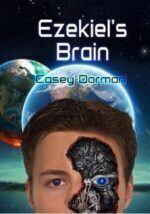If you read science fiction, this is a great time to live in. If you haven’t tried reading science fiction or think it’s not for you, this is an even better time to live in. On television right now, we have two of the genre’s all-time classics being presented, one as a film, one as a series. HBO Max is streaming a new version of Frank Herbert’s classic, Dune. It’s also in theaters. This is the novel that served as the initiation of many science fiction afficionados back in the 1960s. I haven’t seen the film yet, but it has good reviews and I’m willing to shell out the extra bucks just to be reminded of how great the story is. On Apple TV, Isaac Asimov’s Foundation is being presented as a TV series. Also getting good reviews, this is a second in the grand trilogy of scifi, which also includes Robert Heinlein’s Stranger in a Strange Land (followed closely by Arthur C. Clarke’s Childhood’s End and Ursula LeGuin’s Left Hand of Darkness).
But, in terms of reading, what is fantastic right now are the books coming out by the new generation of writers. Last blog entry I told you about Arcady Martine’s novels, A Memory Called Empire and A Desolation Called Peace, the former a 2020 Hugo Award winner. With Arcady Martine, science fiction becomes literary writing, with poetry of language and characters that are beautiful to experience. This time I want to discuss two other novels, opposites in some ways, that express the breadth of the field. If I were to give a title to this presentation, it would be “from science to imagination.”
From the scientific side, Vera Tinych’s The Transfer, although an incomplete novel, is the most loaded with science and engineering information of any science fiction I have read. If you think you don’t like scifi because it is scientifically implausible, you need to read this novel. The transfer that it’s about is from a human mind to a computer and back again. The technology that could make this possible is described in detail by an author with a scientific and engineering background that allows her to make the process believable. In fact, something along the lines of what the story proposes may someday happen. If you don’t like science or technical detail, this isn’t the book for you, although its plot and characters are well-developed and enough to carry the story by themselves. But it is real science and real scientific speculation. The author calls it a semi-novel, but it’s the real thing.
On the imaginative side, I just finished reading Adrian Tchaikovsky’s Children of Time, the 600-page Arthur C. Clarke Award winner published in 2015. Science fiction is not real science, it is speculative science, sometimes very similar to real science, such as in Tinych’s The Transfer, and sometimes speculating on the boundaries of science. Most of the latter types of scifi use fairly standard speculative tropes, such as jump-gates, warp drives, superintelligent AIs, etc. Children of Time avoids such tropes and instead, takes science to places it has not gone before. A human society that is not only the culmination of humanity’s penchant for self-destruction, but a self-destroying society that is built upon a previously self-destructing human culture, which only exists as a distant, almost mythological memory. Genetic inheritance is turned on its ear so that it is not just Darwinian, but Lamarckian: experiences and learning are passed from one generation to another. The race that is marching toward the stars as a result of profiting from this newfound inheritability of knowledge, is not even human, it is arachnoid—spiders. And the spider brain and society are, true to form, “spider-like” as they develop, even to the point of creating organic computers made from chemically guided groups of ants mindlessly carrying out simple functions as part of a larger, organized, intelligent whole. At some point in the millennia of time that passes in the novel, the human and arachnoid society must come in contact. And they do, forming a new, hybrid society that I presume is described in greater detail in the sequel to this book, Children of Ruin.
From the classics Dune and Foundation to modern classics, such as A Memory Called Empire and Children of Time, plus a venture into highly scientific science fiction, with The Transfer, there is just a lot of great scifi available for readers and fans right now. I hope some of you take advantage of it.
I’ve tried to make my own contribution to scientific and imaginative science fiction with my novel, Ezekiel’s Brain. It’s a plausible story of the creation of artificial intelligence and the transfer of a scientist’s brain into a computer, but with a lot of added twists. The extinction of the human race is one of these twists, but the creation of a race of intelligent androids who dedicate themselves to exploring space is another. If you’re a fan of speculative fiction, or just want to try reading something to get your feet wet, Ezekiel’s Brain is a good book for you.
Do you love “mind-bending science fiction?” Read Casey Dorman’s Ezekiel’s Brain. Buy it on Amazon.
Want to receive regular updates on new books, new ideas and the latest in literature and science fiction? Subscribe to Casey Dorman’s newsletter. Click Here.
